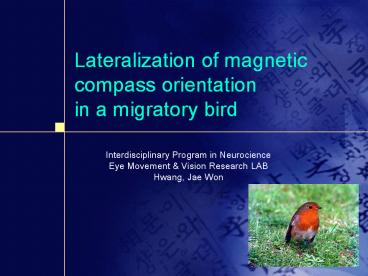Interdisciplinary Program in Neurocience - PowerPoint PPT Presentation
1 / 9
Title:
Interdisciplinary Program in Neurocience
Description:
Fibres of the optic nerves cross over completely. ... able to derive the relevant directional information from the geomagnetic field. ... – PowerPoint PPT presentation
Number of Views:10
Avg rating:3.0/5.0
Title: Interdisciplinary Program in Neurocience
1
Lateralization of magnetic compass orientationin
a migratory bird
Interdisciplinary Program in Neurocience Eye
Movement Vision Research LAB Hwang, Jae Won
2
Lateralization of Birds Brain
- In Birds,
- Fibres of the optic nerves cross over completely.
- Interhemispheric commissures are comparatively
small. - As a consequence, visual input from the right eye
is predominantly processed by the left hemisphere
and vice versa.
3
Studies with monocular birds -1
- A division of function btw hemispheres
- The left eye/right hemisphere is specialized for
geometric aspects of visual cue and novelty. - The right eye/left hemisphere predominantly
process object vision.
4
Studies with monocular birds -2
- A superiority of the left brain hemisphere in
processes involving flight control, navigation
and homing - Monocular birds using their right eye performed
consistently better than those using their left
eye. - Under overcast conditions, the difference btw two
groups was markedly increased. ? possible
involvement of the magnetic compass
5
Magnetic Compass Orientation
- In birds, magnetic compass orientation is based
on light-dependent processes assumed to take
place in the eyes.
6
European Robins
- Robins are small birds with a body length of
14cm. They have a distinctive red face and
breast, and brown wings and back. - For the monocular tests, one eye of the robin was
covered with a cap so that light could reach the
other eye only.
7
Orientation Behavior
a. Binocular control b. Monocular left eye c.
Monocular right eye d. Monocular right eye in a
magnetic field with the vertical component
inverted
8
Orientation Performance
ab the mean heading of two recordings. rb
vector length, indicating how well the headings
of two tests coincide. rcos(?a/2)
9
Conclusion
- Being forced to use their right eye only did not
adversely affect the birds ability to orient
with the help of their magnetic compass. - Birds with monocular use of their left eye failed
to orient, which implies that they were not able
to derive the relevant directional information
from the geomagnetic field.































